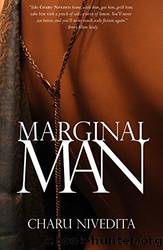Marginal Man by Charu Nivedita

Author:Charu Nivedita [Nivedita, Charu]
Language: eng
Format: epub
Publisher: Zero Degree Publishing
Published: 2018-01-31T05:00:00+00:00
*Translated by A.K. Ramanujan
Chapter Fourteen
Hum Tum Ek Kamre Mein Bandh Ho
Johnny Mera Naam starring Dev Anand and Hema Malini; Sachcha Jhoota starring Rajesh Khanna and Mumtaz; Kati Patang and Aan Milo Sajna starring Rajesh Khanna and Asha Parekh; Purab aur Paschim starring Manoj Kumar and Saira Banu; Safar starring Rajesh Khanna and Sharmila Tagore; Kab, Kyon aur Kahan starring Dharmendra and Babita Kapoor; Dastak starring Sanjeev Kumar and Rehana Sultan… and this ‘70s litany, like Rose’s heart in Titanic, could go “on and on,” with the infinite permutations and combinations of hero and heroine, lover and beloved, Romeo and Juliet, and… I think you get the picture.
Another thing you should “get” is the fact that these Hindi films usurped the throne of popularity down south with the likes of Aradhana, Kati Patang and Bobby riding high on celebrity and running to full houses. And what could this upsurge of Hindi cinema’s popular appeal be attributed to if not the dwindling appeal of Tamil cinema? The ‘60s and the ‘70s saw the lure of homegrown films hit an all-time low. The brightest stars in Tamil Nadu’s thespian-galaxy, M. G. Ramachandran and Sivaji Ganesan, were beginning to lose their luster.
M.G.R.’s Ulagam Sutrum Vaaliban received more ridicule than relish on its silver jubilee as the spectacle of an old geezer (miscast in the role of a young Romeo) prancing around with a young lass in full bloom was far from being amusing in the slightest.
Following the dissolution of the partnership of music duo Vishwanathan and Ramamurthy in 1965, Tamil cinema was relegated to such a sorry place that folks would rather walk out for a smoke than suffer through a song.
The most unforgettable year of the ‘70s for me was 1973 – the year Bobby hit the screen. At that point in time, the number of films I’d seen was exceeded by the number of film songs I’d listened to. Bobby, unlike its inferior cousins, was not a film to be watched just once. The hype over the film spread like a contagion, and my peers and I happened to be among the affected. We would faithfully attend screenings of Bobby like Sunday services. Friends of mine from whose barrels no paisa could be scraped would stand outside the theater during the shows.
In Bobby’s glory-days, a 29 paise ticket got you a bench with no back, a 58 paise ticket afforded you a seat with comfort guaranteed to both your back and your backside. Much like the modern-day college, entries and exits were proceduralized. It would have been ticket for out-pass if you wanted to get out, and out-pass for ticket if you wanted to get back in. The early birds got the best perches in terms of seats.
Bobby’s maiden screening was at Aruna Theater in Trichy. After having run there for a staggering 175 days, it was picked up by Gaiety. Yaadon ki Bharat was also abreast of Bobby in terms of popularity, having enjoyed a year-long run in the latter.
Download
This site does not store any files on its server. We only index and link to content provided by other sites. Please contact the content providers to delete copyright contents if any and email us, we'll remove relevant links or contents immediately.
In Control (The City Series) by Crystal Serowka(35361)
The Wolf Sea (The Oathsworn Series, Book 2) by Low Robert(33847)
We Ride Upon Sticks by Quan Barry(33288)
Crowbone (The Oathsworn Series, Book 5) by Low Robert(32333)
The Book of Dreams (Saxon Series) by Severin Tim(32240)
The Daughters of Foxcote Manor by Eve Chase(22290)
Trainspotting by Irvine Welsh(20055)
Call Me by Your Name by André Aciman(18965)
Shot Through The Heart (Supernature Book 1) by Edwin James(17927)
The Secret History by Donna Tartt(16624)
The Girl from the Opera House by Nancy Carson(14987)
Sad Girls by Lang Leav(13353)
American King (New Camelot #3) by Sierra Simone(12983)
Pimp by Iceberg Slim(12931)
All the Missing Girls by Megan Miranda(12750)
The Betrayed by Graham Heather(11698)
The Betrayed by David Hosp(11671)
4 3 2 1: A Novel by Paul Auster(11050)
Still Me by Jojo Moyes(9903)
